INTEGRATED COASTAL ZONE MANAGEMENT (ICZM)
WHAT IS INTEGRATED COASTAL ZONE MANAGEMENT (ICZM)?
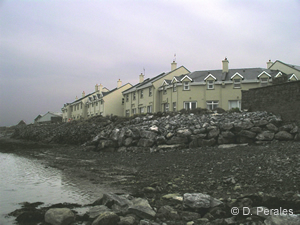 |
| Residential Coastal
Development in Ballyvaughan Bay, County Clare |
The concept of Integrated Coastal Zone Management (ICZM) has developed in recent times in recognition of the declining status of coastal zones, e.g. resource depletion, over development, habitat loss, pollution, vulnerability to climate change and sea-level rise, coupled with an awareness of the benefits of adopting an integrated approach to coastal management practices. ICZM may also be an effective means of avoiding and resolving conflicts where there are competing uses of coastal areas, amenities and resources. A number of definitions have been offered for the term ‘ICZM’. A useful definition is that adopted by the CoCoNet project as ‘a process that brings together all those involved in the development, management and use of the coast within a framework that facilitates the integration of their interests and responsibilities’. Regardless of the exact definition of ICZM, the overriding goal is to manage and conserve the natural resources of the coast, as well as to seek to integrate the social and economic concerns of the various stakeholders in the coastal areas. Thus, the key functions of ICZM are:
- Promoting environmentally sustainable economic development
- Reducing conflicts
- Promoting more integrated planning of marine activities
- Improving land-use planning
- Maintaining the biological diversity and productivity of coastal ecosystems
Clearly then, ICZM is important for the protection of Ireland’s
marine and coastal heritage. For further information on the issues concerned,
and further definition of ICZM, see the EU Information Brochure on ICZM
(EU Focus on Coastal Zones) (Click here).
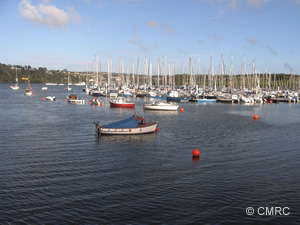 |
The marina in Kinsale, County
Cork is used for recreational purposes |
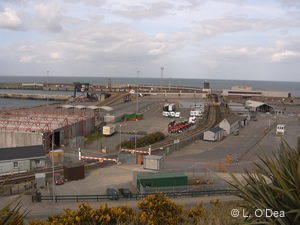 |
Transport Infrastructure in Rosslare
Harbour, County Wexford |
In the absence of concrete European and national legislative instruments for integrated coastal management, local authorities can, and do, enact bye-laws in respect of the foreshore and the coastal waters adjoining their functional area. A number of local authorities have enacted beach bye-laws to control specific activities, e.g. jet-skiing and driving. MacLeod et al. (2000) provide an overview of the use of bye-laws for beach management in Ireland.
ICZM CASE STUDIES
A recently completed review of ICZM best practice, commissioned by the Heritage Council, outlines ICZM case studies in the UK, Norway, Australia and New Zealand. These include one of the best and most well known examples of successful implementation of ICZM in the world – Australia’s Great Barrier Reef Marine Park. Other examples include:
- Scottish Coastal Forum
- North Wales Coastal Forum
- Dorset Coast Forum
- Severn Estuary Partnership
- Moray Firth Partnership
- New Zealand Oceans Policy
The following is a sample of some completed and ongoing national and
European projects relating to ICZM in the Irish coastal zone.
Completed Projects
-
CoCoNet (Coastal Communities Network)
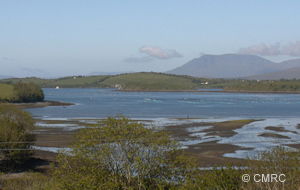 |
| Aquaculture in Bantry
Bay, County Cork |
IMPLEMENTING ALTERNATIVE STRATEGIES IN IRISH BEACH AND DUNE MANAGEMENT
Donegal County Council and the University of Ulster (Centre for Coastal and Marine Research) undertook this project under the LIFE Programme as part of the European ICZM network (Demonstration Programme). It was designed to demonstrate the practice of Integrated Coastal Zone Management by developing and implementing sustainable uses of dune systems and involving local communities in the conception and implementation of coastal management plans and projects. Twelve coastal dune sites in Counties Down and Donegal, which have been subject to increased tourism and rural development pressure, formed the study area. The project resulted in a number of research publications and a code of practice for rural beaches (click here).
BERE ISLAND CONSERVATION PLAN
The Bere Island Conservation Plan is an integrated management strategy to ensure that future development on Bere Island is sustainable and affords proper protection to the island’s heritage. The stimulus for the plan arose from the islanders’ concerns about the long-term survival of the island’s built and natural heritage and the desire to maintain a viable, vibrant island community. The plan stresses the role of heritage conservation in maintaining the quality of life and the need to encourage local communities to become involved in heritage protection. The final plan is based on a series of extensive reports on all aspects of the island, including geology; folklore; and natural, archaeological, architectural and cultural heritage. These reports are available from the Heritage Council. The full text of the Conservation Plan can be read here.
COCONET (COASTAL COMMUNITIES NETWORK)
The Coastal and Marine Research Centre (UCC) was the Irish partner in the CoCoNet project. The objective of CoCoNet was to establish a network to promote Integrated Coastal Management in the INTERREG IIIA area (Ireland-Wales). It aimed to develop a network of community stakeholders with an interest in sustainable management of their local coastal resources. Stakeholders included national and regional authorities, local community interest groups (e.g. fishermen, tourist operators, aquaculture operators, conservationists, property developers, shipping operators, etc.). Two of the key issues to emerge from the study were the lack of public awareness of coastal issues and the political apathy towards coastal management. To address these, the Wexford Declaration was formulated, calling on governments to support the empowerment of local communities, including local government, to secure local sustainability of the coastal and marine environment. For further information on the CoCoNet project and to download a copy of the final report, click here.
REVIEW OF ICZM IN MANAGEMENT & PRINCIPLES OF BEST PRACTICE
This report, commissioned by the Heritage Council, compiled existing information on Integrated Coastal Zone Management and best practice and made recommendations to be considered when formulating ideas concerning approaches to ICZM in Ireland. The report also includes a review of national case studies from the UK, Norway, New Zealand and Australia and a comprehensive bibliography on ICZM. Click here, to read about the project and download the report.
COPRANET (COASTAL PRACTICE NETWORK)
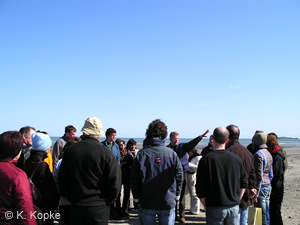 |
| CoPraNet Fieldtrip
to Ballycotton, County Cork during the CoPraNet Conference April
2006 hosted by the CMRC in Cork |
The Coastal and Marine Resources Centre (UCC) is the Irish partner in the CoPraNet project (2004-2006) – funded by the Interreg IIIC (West) programme. The project aim is to help establish a coastal practitioners' network and bridge the gap between planners, managers and the research community throughout Europe. It has been set up to develop and exchange information on best practice in the coastal zone on the issues of sustainable tourism and coastal erosion and beach management. For further information on the CoPraNet project click here.
COASTATLANTIC
Five Irish partners (Mayo
County Council, Donegal
County Council, Galway
County Council, Kerry
County Council and NUI Galway), through the NASC
Irish Partnership, are participating in the INTERREG
IIIB (Atlantic Area) funded COASTATLANTIC project. The overall objective
of the project is to test the implementation of Integrated Coastal Zone
Management, particularly in the context of spatial planning and achieving
sustainable development, and in promoting environmental, social and economic
well being of the coast. The project aims to implement specific thematic
aspects of ICZM (natural heritage, cultural heritage, access and interpretation,
GIS and Urban Rural Interdependencies) and the results from the project
will contribute towards the development of National Strategies for ICZM;
in accordance with the EU Recommendation Concerning the Implementation
of ICZM. The Irish partners in the project are focusing on the thematic
action of 'Coastal Access'. For example, the main focus of Mayo County
Council's project is on getting stakeholders involved at local level and
identifying the key issues in the Clew Bay area, in order to provide the
basis for an ICZM framework. The coastal access part of the project concentrates
on beach management looking at Bertra Beach in Westport. NUI, Galway are
using remote sensing, GIS and fieldwork to assess the impact of future
sea level rise on the coastal zone in Galway, Mayo and Donegal. For further
information on the COASTATLANTIC
project, click here.
COREPOINT
- COASTAL RESEARCH POLICY INTEGRATION
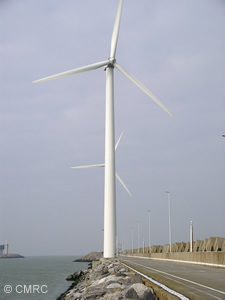 |
| Wind Turbines on
the Belgium Coast, photo taken on fieldtrip at COREPOINT-Conference
in Belgium February 2006 |
· Building European and local capacity to implement ICZM programmes;
· Providing concrete solutions for current problems in the Northwest region using best practice; approaches and identifying models for sustaining ICZM initiatives;
· Promoting social and political responsibility for the coastal environment;
· Influencing national spatial policy development in response to the EU Recommendation on ICZM; and
· Develop an integrated coastal information management system for Northwest Europe.
As part of the project, practical integrated coastal management initiatives will be implemented. In Ireland, this will include sustainable beach management in Donegal and a coastal management study in Cork Harbour. The Irish COREPOINT partners are the Coastal and Marine Resources Centre (UCC), the Marine Law & Ocean Policy Centre (National University of Ireland, Galway) and the Centre for Coastal and Marine Research (University of Ulster, Coleraine). Click here, for further information on the COREPOINT project.
CYCLEAU
The Cycleau project (funded under INTERREG IIIB – NW Europe) aims to form a shared, integrated approach to the planning and management of natural water resources in the coastal zone by combining resource planning and management in the coastal zone with whole area catchment planning and management. It will produce a methodology that can be used as a roadmap by communities wishing to use best practice in environmental management. Moy Valley Resources, an Integrated Resource Development Company (IRD), is the Irish partner in the Cycleau project. Focusing on the Moy River catchment, one of its actions is to raise awareness of the effects of agricultural pollution on shellfish farming. Click here, for further information on the CYCLEAU project.
CO-ORDINATED LOCAL AQUACULTURE MANAGEMENT SYSTEMS (CLAMS)
The Co-ordinated Local Aquaculture Management Systems (CLAMS) process is a nationwide initiative to manage the development of aquaculture in bays and inshore waters at a local level. It allows for the integration of aquaculture into the coastal zone, whilst recognizing the need to improve environmental compliance, product quality and consumer confidence. The process has been adopted and CLAMS plans have been published for nine bays around the coast to encourage public consultation on their current operations and their future plans.
These areas are:
• Bannow Bay
• Roaringwater Bay
• Castlemaine Harbour
• Lough Swilly
• Clew Bay
• Killary Harbour
• The North Shannon Estuary
• Dungarvan Harbour
• Kilkieran
Bay
It is envisaged that by the end of the National Development Plan (NDP)
in 2006, every major aquaculture embayment in Ireland will have a completed
CLAMS plan and an active local CLAMS group. Further information on CLAMS
can be obtained from the Marine
Institute or Bord
Iascaigh Mhara.
I-CoNet
I-CoNet launch in UCC, April
2006 |
- An annual national coastal conference for Ireland;
- A contacts' database and network website;
- A point of contact for the circulation of information (e.g. promotion of relevant events - workshops, conferences, training courses and positions vacant);
- A link to other European projects (e.g. Corepoint, CoPraNet).
URLs
EU
Focus on Coastal Zones - http://europa.eu.int/comm/environment/iczm/pdf/2000brochure_en.pdf
O'Hagan
and Cooper - http://mri.nuigalway.ie/marinelaw/Docs/
Extant%20Legal%20and%20Jurisdictional%20Constraints%20on%20Irish%20Coastal%20Management.pdf
EC
Demonstration Programme - http://europa.eu.int/comm/environment/iczm/demopgm.htm
EU strategy for Integrated Coastal Zone Management
- http://europa.eu.int/eur-lex/en/com/cnc/2000/com2000_0547en01.pdf
EU ICZM Recommendation -
http://europa.eu.int/eur-lex/pri/en/oj/dat/2002/l_148/l_14820020606en00240027.pdf
EU ICZM Policy Page - http://europa.eu.int/comm/environment/iczm/home.htm#zone1
MacLeod et al. - http://mri.nuigalway.ie/marinelaw/Docs/
The%20Potential%20of%20a%20Legislative%20Approach%20to%20Managing%20Beach%20Use.pdf
Scottish
Coastal Forum - http://www.scotland.gov.uk/environment/coastalforum/
New Zealand Oceans Policy - http://www.mfe.govt.nz/issues/oceans/
Severn Estuary Partnership - http://www.severnestuary.net/sep/
Moray Firth Partnership - http://www.morayfirth-partnership.org/
European ICZM Bibliography - http://europa.eu.int/comm/environment/iczm/biblio.htm
Comprehensive
ICZM Links - http://www.coastalguide.org/links/
Socio-economic costs and benefits of ICZM
- http://europa.eu.int/comm
/environment/iczm/pdf/socec_en.pdf
EUCC - The Coastal Union - http://www.eucc.nl/
EUCC Coastal Guide - http://www.coastalguide.org
The Contributions of Science to Integrated
Coastal Management
(GESAMP Report) -
http://gesamp.imo.org/no61/w1639e00.pdf
EC
Demo Programme - http://europa.eu.int/comm/environment/iczm/
CMRC - http://cmrc.ucc.ie/
CoCoNet - http://coconet.ucc.ie/
INTERREG
IIIA - http://www.interreg.ie/main.html
Review of ICZM - http://cmrc.ucc.ie/pages/projects/iczm%20practice.htm
CoPraNet - http://www.coastalpractice.net/
INTERREG
IIIC - www.interreg3c.net
NASC
- http://www.nasc.ie/english/htm/index.htm
INTERREG IIIB (Atlantic Area) - http://www.interreg-atlantique.org/iiib/eng/index.htm
COASTATLANTIC - http://www.severnestuary.net/sep/Coastatlantic.htm
INTERREG IIIB (NW Europe) - http://www.nweurope.org/
Centre for Coastal and Marine
Research (
COREPOINT - http://corepoint.ucc.ie/
Marine Law & Ocean Policy Centre (NUIGalway)
COREPOINT - http://mri.nuigalway.ie/marinelaw/Projects/corepoint.html
CYCLEAU Home Page - www.cycleau.com
Marine Institute Info on CLAMS
- http://www.marine.ie/industry+services/aquaculture/clams/
BIM Info on CLAMS - http://www.bim.ie/templates/text_content.asp?node_id=244
Selected Further Reading
Brady Shipman Martin, 1997.
Coastal Zone management - A Draft Policy for Ireland. Report prepared for the Department of Arts,
Heritage, Gaeltacht and the Islands;Department of the Environment and
Local Government; and Department of Marine and Natural Resources.
EC (European Commission), (2000). A Communication from the
Commission to the Council
and the European Parliament on Integrated Coastal Zone Management:
A Strategy for Europe (COM/2000/547).
http://europa.eu.int/eur-lex/en/com/cnc/2000/com2000_0547en01.pdf
GESAMP (IMO/FAO/UNESCO-IOC/WMO/WHO/IAEA/UN/UNEP
Joint Group of Experts on the Scientific Aspects of Marine Environmental
Protection).
The contributions of science to coastal zone management.
Reports and Studies, GESAMP. No. 61. Rome, FAO. 1996. 66p.
http://gesamp.imo.org/no61/w1639e00.pdf
Government of Ireland. 1996. Environmentally Friendly Coastal
Protection:
ECOPRO Code of Practice. The Stationery Office, Dublin.
MacLeod, M., Cooper, A., McKenna, J., Power, J., and O'Hagan,
A.M. (2000).
The Potential of a Legislative Approach to Managing Beach Use:
The Case of Beach Bye-Laws in the Republic of Ireland. Coastal
Management, 28: 363-382. http://mri.nuigalway.ie/marinelaw/Docs/
The%20Potential%20of%20a%20Legislative%20Approach%20to%20Managing%20
Beach%20Use.pdf
McKenna, J., MacLeod, M., Power, J. and Cooper, A. (2000).
Rural Beach Management: A Good Practice Guide. Donegal County Council.
National Coastal Erosion Committee, 1992. Coastal Management - A Case for Action. County and City Engineers Association and the
Irish Science and Technology Centre.
O'Hagan, A.M. and Cooper, A. (2001). Extant Legal and Jurisdictional Constraints
on Irish Coastal Management. Coastal Management, 29: 73-90.
O'Hagan, A.M. and Cooper, J.A.G. (2002). Spatial variability in approaches to coastal protection in Ireland. Journal of Coastal Research, Special Issue 36: 544-551.